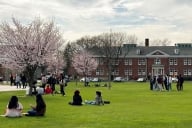You have /5 articles left.
Sign up for a free account or log in.
It's 3 a.m. on the East Coast.
A student stationed abroad has just typed an e-mail to Michelle Reitze, a military academic adviser at the University of Maryland University College. Hours later, Reitze sees the message when she enters her cubicle. She's the primary long distance contact for hundreds of students and is used to receiving their pre-dawn questions.
During a reporter's visit, Reitze has temporarily taken herself off the list of available advisers for students calling a main office line. Otherwise, she explains, we’d be interrupted every few minutes by the phone. As it is, Reitze’s e-mail inbox is filling up with requests to talk about class scheduling and credit transfers. She’s still available to her assigned students that want to call her directly, though in the 25 minutes we speak, no one tries her number.
“It was a rather uncommon event to not receive any calls from my students,” Reitze explains.
She and her enrollment management colleagues work out of a typical administrative campus building that is the hub of University College's academic advising operation. They are dealing with many of the same issues as their counterparts at colleges that are primarily residential. But given the nature of UMUC, a degree-granting institution within the University System of Maryland that is known for offering online classes to students across the globe, the advisers operate a bit differently than most.
For one, most of their conversations with students aren't face to face. They are through e-mail or phone and the occasional online chat, as is the case when there's a planned discussion for prospective or new students. This long distance arrangement presents a recurring challenge for the UMUC adviser: Establish a connection with a student who might never step foot in the central office.
At a time when more colleges are offering classes in far-flung places, the work of the advisers at UMUC offers a glimpse of where higher education advising could be headed. Several advisers mention the phrase "customer service" when describing their job. They are in constant communication with domestic students and those located abroad. The college's official policy is to respond to messages within 48 hours, but the advisers say they try to be more prompt than that. Some give out cell phones and check their computer late into the night.
“If a student pours her heart into this e-mail, she doesn’t want me to wait until my shift starts at 9 a.m.,” says Barbara Mc Kaig, an academic coordinator who works with military students stationed in the Washington area. “They know they'll get a response from me in no less than six hours. I tell them, think of me as your private secretary and concierge.”
Someone in enrollment services is available to students from early morning until well into the evening Monday through Saturday. An 800 number is set up for students with basic questions about classes, and there's also a 24-hour technical support line. Active-duty military personnel stationed overseas typically have an education center that they can visit for guidance.
Often times, students are fitting in classes around other obligations. Mc Kaig travels to military bases to meet with active-duty military in various branches who are enrolled at UMUC. Most of her students are in the Army, and some are Department of Defense contractors, retirees and spouses of active-duty personnel. Many military students, like others at UMUC, aren't first-time college goers. That makes questions about credit transfer common, Mc Kaig says.
For the advisers, it's often a matter of prioritizing messages. A student who's bumping up against an enrollment deadline might get the first call. Someone who wants to change his major likely won't. It's easy for the advisers to spend the entire day responding to questions, but they try also to initiate contact with new students who know them only through e-mail.
Every time an adviser communicates with a student, the nature and content of the conversation is logged in an online system open to everyone in the department. That's done both so an adviser who's dealing with hundreds of assigned students can remind herself of past conversations, and so another person on staff who answers the main line can research an unfamiliar student on the fly.
On this weekday afternoon, Melissa Stein, an academic adviser who specializes in new students in the military, is scrolling through notes in the system while a student is on the phone. On a busy day, Stein estimates that she speaks with 25 students. Her shift is typically weekday afternoons and evenings, as well as Saturdays.
“New students are expecting to leave a message," she says. "They are excited -- and I think usually surprised -- that someone is live on the phone."
On many campuses, a student might speak to his adviser during a required meeting and not again until next term. But with many adult students returning to classes after years of being away, contact tends to be more regular at UMUC, says Akeema Williams, who advises undergraduates in their first semester, as well as prospective students.
Williams says that before classes begin, she's well aware that hers could be the first voice from the college a student hears. Her strategy: encourage them to explain why they're enrolling.
“They start sharing with me things like, ‘I have this many kids, and this many jobs, and here are my goals and concerns,' " Williams says. "It touches me every semester that they have the motivation to start and bring their plan to fruition.”








